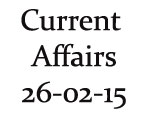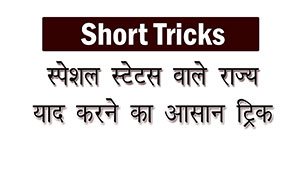-
Current Affairs 26th February 2015
Updated : 26-Feb-2015
Current Affairs 26th February 2015 - Important Points
Who had accepted the 14th Finance Commission recommendations - Union Government
Who has approved the creation of two additional benches of the Authority for Advance Rulings - Union Cabinet
With whom Russia signed an agreement to allow Russian navy ships to use ports - Cyprus
Name the quasar discovered by scientists - Ultra-luminous quasar SDSS J0 100+2802
Union Cabinet approved the implementation of Grid-connected SPV Projects under NSM of how mnay MW - 15000 MW
For what purpose did Mumbai University signed MoU with Indian Railways - To set up Rail Innovation and Technology Centre
Who has presented the Railway Budget 2015-16 - Railway Minister Suresh Prabhu
Current Affairs 26th February 2015 - Details
Who had accepted the 14th Finance Commission recommendations - Union Government
In February 2015, Union Government accepted the recommendations of the 14th Finance Commission. Former Reserve Bank of India (RBI) Governor Dr. YV Reddy headed the commision to provide more power to the states for their progress.
Directions of the 14th Finance Commission
- Tax dispersal should be the primary route for transfer of resources to the states.
- The increased dispersal of the divisible pool of taxes is a compositional shift in transfers – from grants to tax devolution.
- The panel recommended horizontal distribution by using broad parameters like population (1971) and changes in population since then, forest cover, income distance and area among others.
- Distribution of afford to States and local body was recommended by using 2011 population data with weight of 90 percent and area with weight of 10 percent.
- Afford to States should be divided into two and they are :
- Afford to duly constituted Gram Panchayats
- Afford to duly constituted municipal bodies
- Afford should be divided into two parts and they include, basic grants – depending upon the performance of the municipal bodies and gram panchayats. The ration of performance to basic afford is 80:20 for municipalities and 90:10 for Panchayats.
- It recommended a total grant of 287436 core rupees for a period of five-years. In this fund, 200292 crore rupees will go for panchayats while the remainder will go to the municipalities.
- In respect to various Centrally-sponsored schemes there is a need to change the sharing pattern. It wants the states to share a greater revenue responsibility for the implementation of such schemes.
The 14th Finance Commission
In accordance to the Article 280 of the Constitution of India, On 2 January 2013, the 14th Finance Commission (FFC) was constituted by the orders of President. On 15 December 2014, the commission submitted its report with recommendations to the President Pranab Mukherjee.
Who has approved the creation of two additional benches of the Authority for Advance Rulings - Union Cabinet
On 25th February 2015, Union Cabinet approved the creation of two additional benches of the Authority for Advance Rulings (AAR) which will be established in New Delhi and Mumbai. Two posts of Vice-Chairmen will be created in the Apex scale and four posts of Members (two posts of Revenue Members and two posts of Law Members) in the Higher Administrative Grade (HAG+) for these two benches. Two posts of Secretary at the level of Commissioner of Income Tax or Joint Secretary will also be created. The cabinet also approved one time outlay of 7.48 crore rupees for establishment of the two additional benches and additional annual recurring outlay of 6.61 crore rupees for running these two additional benches.
About Authority for Advance Rulings (AAR)
A scheme of Advance Rulings was introduced in the Chapter XIX-B of the Income-Tax Act, 1961 and the Authority for Advance Rulings (AAR) was constituted in 1996 in order to provide the facility of understanding the Income-tax liability of a non-resident. A retired Judge of the Supreme court becomes the Chairman of AAR and two members of the rank of Additional Secretary to the Government of India, one each from the Indian Legal Service and the Indian Revenue Service.
With whom Russia signed an agreement to allow Russian navy ships to use ports - Cyprus
On 25th February 2015, Russia and Cyprus signed an agreement to give access to Cypriot ports in the Mediterranean Sea to Russian navy ships. Russian navy ships that will dock at Cypriot ports would mostly be used in counter-terrorism and anti-piracy efforts. Russian President Vladimir Putin and Cypriot President Nicos Anastasiades signed the agreement in Moscow. The military deal also included the possibility of Russia using an air base on Cyprus for humanitarian relief missions.
Name the quasar discovered by scientists - Ultra-luminous quasar SDSS J0 100+2802
On 26th February 2015, the international team of scientists led by astronomers from Peking University in China and from the University of Arizona discovered the brightest quasar SDSS J0 100+2802 with the most massive black hole of 12 billion solar-mass.
Findings of the Study
- The quasar named SDSS J0100+2802 is at a distance of 12.8 billion light-years from Earth with the luminosity of 420 trillion suns.
- Its size is seven times brighter than the most distant quasar known which is 13 billion years away.
- The quasar dates back to the end of an important cosmic event that is referred as the era of reionization. Re-ionization era is the cosmic dawn when light from the earliest generations of galaxies and quasars is thought to have ended the cosmic dark ages and transformed the universe into how we see it today.
About Quasars
- Quasars were discoverd in 1963 and are the most powerful objects beyond the Milky Way galaxy.
- More than 200000 quasars have been discovered by astronomers, with ages ranging from 0.7 billion years after the Big Bang till today.
Union Cabinet approved the implementation of Grid-connected SPV Projects under NSM of how mnay MW - 15000 MW
On 25th February 2015, The Union Cabinet approved the implementation of the scheme for setting up of 15000 Mega Watt (MW) Grid-connected Solar Photo Voltaic (SPV) Power projects under the National Solar Mission (NSM). The scheme will be implemented through National Thermal Power Corporation (NTPC) and NTPC Vidyut Vyapar Nigam Limited (VVNL) in three parts as follows :
- Part 1: 3000 MW of SPV plants will be completed under mechanism of Bundling of solar power (3000 MW) with Unallocated Coal based Thermal Power (1500 MW) in the ration of 2:1.
- Part 2: 5000 MW will be completed with some support from Government to be decided after getting some experience while implementing Tranche-l.
- Part 3: remaining 7000 MW will be completed without any financial support from the Government.
For what purpose did Mumbai University signed MoU with Indian Railways - To set up Rail Innovation and Technology Centre
On 23rd February 2015, Mumbai University signed a memorandum of understanding (MoU) with the Indian Railways to set up a Rail Innovation and Technology Centre to train students for expertise in Railway Engineering.
Highlights of the MoU
- Indian Railways will assign 142.89 crore rupees budget for the centre over the next five academic years.
- Mumbai University will provide financial control, effective administration, distribution of facilities for higher education and education.
- The university will impart practical training to candidates at university’s of Ratnagiri, Kalyan sub campus and Kalina.
- Specialized courses at the Post Graduate level related to rail technology will also be started by the University.
- This institute will help the Indian Railways in developing cutting-edge indigenous technologies and turn as a net exporter of such technologies.
Who has presented the Railway Budget 2015-16 - Railway Minister Suresh Prabhu
On 26th February 2015, Railway Minister Suresh Prabhu presented the Railway Budget 2015-16 in the Lok Sabha. Prabhu outlined a plan to invest over 8 lakh crore rupees over 5 years in his first Railway Budget. The size of the Plan Budget has gone up by 52% from 65789 crore rupees in 2014-15 to 100011 crore rupees in 2015-16.
Highlights of the Railway Budget 2015-16
- There will be no increment in passenger fares.
- Tickets can be booked 120 days in advance instead of 60 days which was available till date
- In future 20% journey time can be saved with new train sets introduced. These trains can run on the existing tracks and will be similar to bullet trains in design.
- There will be a increment in the speed of passenger trains across nine corridors to 160-200 km from 110 km.
- 400 railway stations will be Wi-fi enabled.
- In 2015-16, 10 satellite railway stations will be developed.
- E-catering introduced in 108 trains can be accessed by ordering on IRCTC website.
- 6608 km of track will be electrified.
- CCTVs will be introduced in selected trains and suburban trains for the purpose of Women's Safety.
- Over 2000 stations in next 2 years will be introduced with Centrally managed railway display network.
- All India 24x7 grievances helpline 138 will be started.
- Railways Proposes to set up Malaviya Chair for Railway Technology at IIT (BHU), Varanasi.
- Operation Five Minutes will be introduced to produce a ticket within 5 minutes for Passengers travelling unreserved.
- Train Collision Avoidance System and Train Protection Warning System will be installed on select routes at the earliest.
- To move towards paperless ticketing, hand-held devices will be introduced for ticket checkers.














